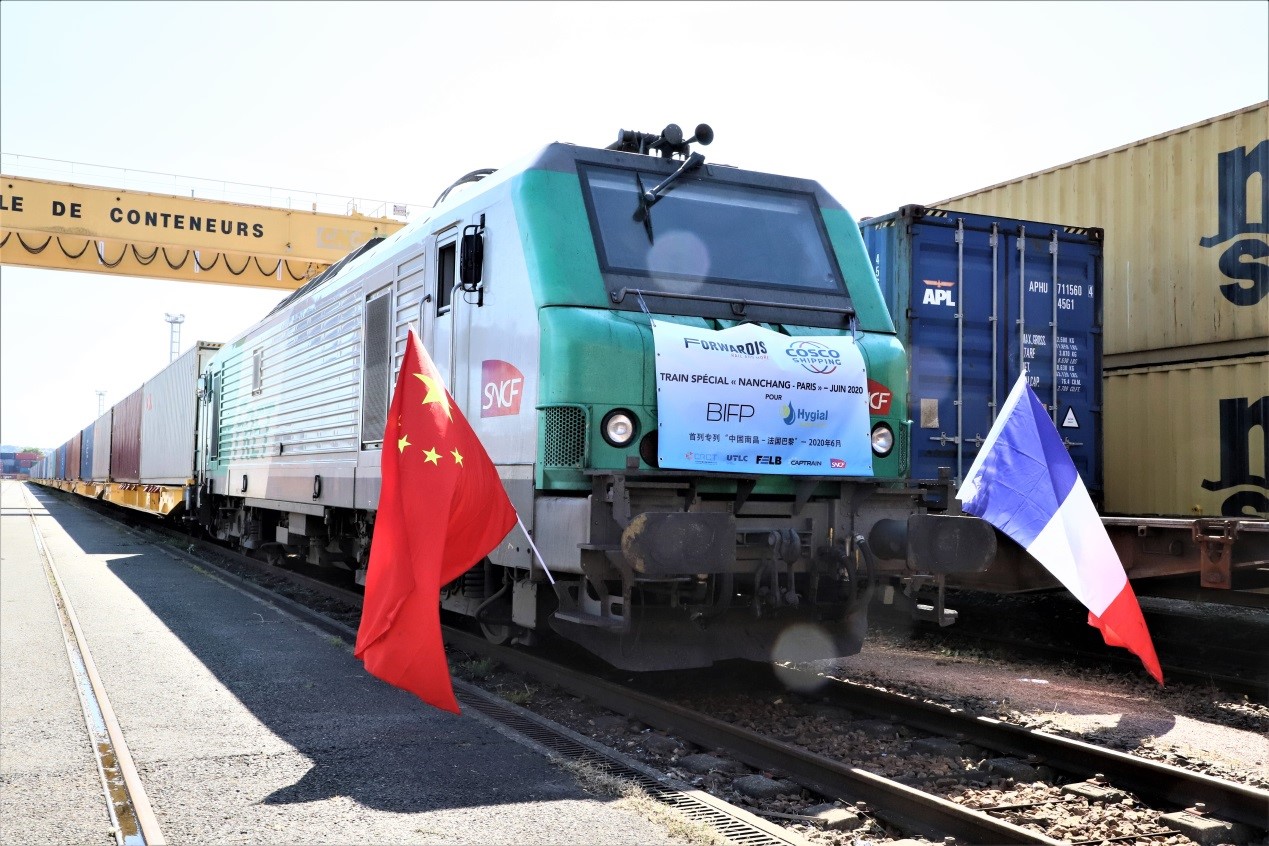

 |
| A China-Europe cargo train loaded with medical materials arrives in Paris from Nanchang, East China’s Jiangxi Province on June 23. Photo by Li Yongqun/People’s Daily |
Putting the health and lives of the people above everything has been the broadest consensus during China’s COVID-19 response, which manifested the value in the governance of the Communist Party of China (CPC), the largest ruling party in the world.
The fight against the epidemic is also a war in defense of human rights. China has mobilized the entire country to combat the virus, fully demonstrating its people-centered approach in human rights protection.
To determine how much a country respects human rights, it is necessary to know how much it respects and safeguards lives in crises.
Since the outbreak, Xi Jinping, general secretary of the CPC Central Committee, has taken personal command and planned the response, emphasizing that people’s lives and health must come first.
China has always placed saving lives in the first place during its fight against the epidemic. The government has covered all the cost for treating COVID-19 patients, which maximumly raised the testing and cure rates, as well as lowered the infection rate and fatality rate as possible as it could.
Hubei Province received nationwide support during China’s epidemic response at the height of the pandemic. Besides, the country has managed to construct the Huoshenshan Hospital in Hubei’s capital Wuhan within just 10 days, and built 16 makeshift hospitals in the city at a speed of 1.5 hospitals per day.
It demonstrated the vital importance attached by the CPC, a Marxist ruling party, on its people, as well as the efforts made by a socialist country to protect human rights.
The fact that the country and its ruling party have mobilized the whole nation to safeguard lives also showed that human rights are an integration of individual and collective rights. Individual rights can only be maximized when combined with collective rights.
How a country treats the socially disadvantaged groups is an important indicator measuring its level of civilization and human rights protection.
“We will never give up on any patient,” said a doctor at the Hanyang branch of the Wuhan Hospital of Traditional Chinese Medicine.
He said that when Xu Ming, a 95-year-old recovered COVID-19 patient came to him to express gratitude on April 16.
Besides, China has introduced and implemented a series of measures for the socially disadvantaged groups to strengthen their capacity to cope with the risks, such as distributing relief funds among people in need and extending the service terms for public service jobs.
The rights to subsistence and development are the primary and basic human rights. The effective guarantee of the rights to subsistence and the steady improvement of living standards are the preconditions and foundations for fulfilling and developing all other human rights.
While preventing and controlling the epidemic, China has made efforts to ensure the basic supplies for people, allocated funds to help companies and stabilize jobs, and progressed in eliminating poverty.
It has not only relied closely on the people to combat the epidemic, but also engaged in improving the well-being of the people, creating the environment for guaranteeing people’s rights.
As it has managed to contain the virus domestically, China has strived to build a global community of shared future amid the pandemic, which is also one of its attempts to safeguard human rights.
It has reported the epidemic to the World Health Organization promptly, shared the genetic sequence of the virus with other countries, and endeavored to help other countries purchase much-needed medical supplies and equipment in China.
As of the end of May, China had shared diagnosis and treatment plans as well as prevention and control formulas with over 180 countries and more than 10 international and regional organizations, dispatched medical teams to countries with urgent needs, and provided medical assistance to nearly 150 countries and four international organizations.
While it bought some precious time for the world in the fight against the epidemic, it has shouldered its responsibility as a major country, demonstrating humanitarianism for the international community.
Living a happy life is the primary human right and the biggest prerequisite for a happy life is to guarantee the lives and health of the people.
China has mobilized the whole nation and paid great cost to protect the health and lives of its people, which is a perfect interpretation of human rights protection.
China’s fight against the epidemic has not only created a miracle in the history of preventing and controlling infectious disease, but also written a glorious chapter in the human rights undertakings and advanced the international cause of human rights.
 |

 Award-winning photos show poverty reduction achievements in NE China's Jilin province
Award-winning photos show poverty reduction achievements in NE China's Jilin province People dance to greet advent of New Year in Ameiqituo Town, Guizhou
People dance to greet advent of New Year in Ameiqituo Town, Guizhou Fire brigade in Shanghai holds group wedding
Fire brigade in Shanghai holds group wedding Tourists enjoy ice sculptures in Datan Town, north China
Tourists enjoy ice sculptures in Datan Town, north China Sunset scenery of Dayan Pagoda in Xi'an
Sunset scenery of Dayan Pagoda in Xi'an Tourists have fun at scenic spot in Nanlong Town, NW China
Tourists have fun at scenic spot in Nanlong Town, NW China Harbin attracts tourists by making best use of ice in winter
Harbin attracts tourists by making best use of ice in winter In pics: FIS Alpine Ski Women's World Cup Slalom
In pics: FIS Alpine Ski Women's World Cup Slalom Black-necked cranes rest at reservoir in Lhunzhub County, Lhasa
Black-necked cranes rest at reservoir in Lhunzhub County, Lhasa China's FAST telescope will be available to foreign scientists in April
China's FAST telescope will be available to foreign scientists in April